
The London Interbank Offer Rate or LIBOR is the global reference rate for unsecured short-term borrowing in the interbank market and acts as a benchmark for short-term interest rates at which major global banks lend to one another and, businesses in Bangladesh like borrowers in many other countries, take foreign loans based on the rate.
However, LIBOR is set to be phased out completely by 2023 after the Financial Conduct Authority (FCA), which regulates the financial services industry in the UK, in 2017 maintained the rate would be phased out gradually from 2022 before abolishing it completely from July 2023.
Keeping the same in perspective, Bangladesh’s central bank (Bangladesh Bank) issued a policy recently for banks to calculate the interest rate of short-term foreign loans which will help the exporters and importers prepare for the discontinuation of the LIBOR, so that their borrowing does not suffer.
Banks will now, reportedly, have to consider the benchmark rate of the respective central bank— for instance, if exporters plan to secure loans from the US, they will have to follow the secured overnight financing rate or SOFR as set by the Federal Reserve (the central bank) of the United States and along with the benchmark rate, borrowers will be charged a risk premium of 2.50 per cent and a markup rate of 3.50 per cent (markup is added following the lender determining an approved rate based on the credit history of the consumer) even as local exporters and importers now enjoy short-term foreign loans at the cost of a 6-month LIBOR plus 3.50 per cent per annum while if businesses receive loans from the banks in the Eurozone, the European Central Bank benchmark rate would have to be followed in setting the lending rate whilst the ECB has come up with the Euro Short Term Rate (€STR) benchmark rate, and the UK has introduced the Sterling Overnight Index Average (SONIA) benchmark — before setting a lending rate.






